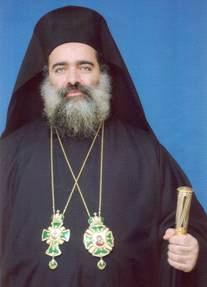Ammon News - AMMAN - Rivalry between Arab and Greek clergymen in the Orthodox Church has resurfaced following a decision by Patriarch Theophilus to dismiss a senior member of the Kingdom’s church court last week.
Christian Orthodox societies held a protest in Amman Tuesday to condemn the decision to dismiss Jordanian Archimandrite Hanna (Christoforos) Atallah and call for "stopping all sorts of discrimination" they claim Greek clergymen are practising to prevent Arabs from having more say in decision making at the patriarchate, which serves believers in Jordan, the Palestinian territories and Israel.
Atallah said he was informed last Tuesday of the decision to dismiss him from his post as vice president of the Orthodox Church court in Amman.
"I was on my way to the court when lawyers told me that I had been removed," Atallah told The Jordan Times over the phone yesterday, describing the decision as "surprising".
Atallah considers the dismissal as part of a series of decisions targeting Jordanian and Palestinian clergymen in the Greek Orthodox Church.
In 2007, Theophilus suspended salaries of Atallah, Archbishop Atallah Hanna and Archimandrite Milathius Basal after they took part in an Amman meeting that called for revoking recognition of the patriarch because he did not fulfil commitments he had pledged prior to his appointment, according to sources from the Amman-based Orthodox Society.
Atallah cited several instances in which Theophilus is "marginalising" Arabs' role in the church.
"He is not giving permission for young believers to become monks, therefore many of them are seeking Orthodox churches abroad," Atallah noted, claiming that the patriarch has opened the door for more Greek theology students and monks to serve in the holy lands.
Atallah said he founded a convent in the northern town of Dibbeen in 1998, but has yet to receive the patriarchate’s recognition.
The clergyman also referred to what he described as a violation of the 1958 law of the Greek Orthodox Patriarchate of Jerusalem.
The law stipulates that the Holy Synod - the patriarchate’s highest decision-making body - should be composed of 18 members who hold Jordanian citizenship, with at least two originally Jordanian bishops or archbishops.
Atallah noted that the only Jordanian member of the synod is an archimandrite, while some four to five Greek members do not have Jordanian nationality.
He said Arab clergymen have no intention of "completely Arabising" the Orthodox Church, but want to have a "fair say in decision making that concerns the rights of Arab believers".
"What we are against is marginalising Arabs in a racist way," he told The Jordan Times.
Despite several attempts to contact them yesterday, neither Patriarch Theophilus nor officials at the Amman branch of the patriarchate were available for comment.
Theophilus III was enthroned in Jerusalem's Church of the Holy Sepulchre in 2005, following the dismissal of Irineos I over sales of church land to Jewish investors.
The appointment of any patriarch has to have the blessing of Jordan and the Palestinian Authority.
Before his appointment, the patriarch had declared his commitment to abide by the 1958 law, in addition to presenting a comprehensive list of all of church assets to the Jordanian government.
In 2007, Amman decided to revoke Theophilus' recognition for “not fulfilling” these obligations.
The government later rescinded the decision after the patriarch pledged to continue efforts to address "the legitimate requests of the congregation". (Jordan Times/ Thameen Kheetan)
